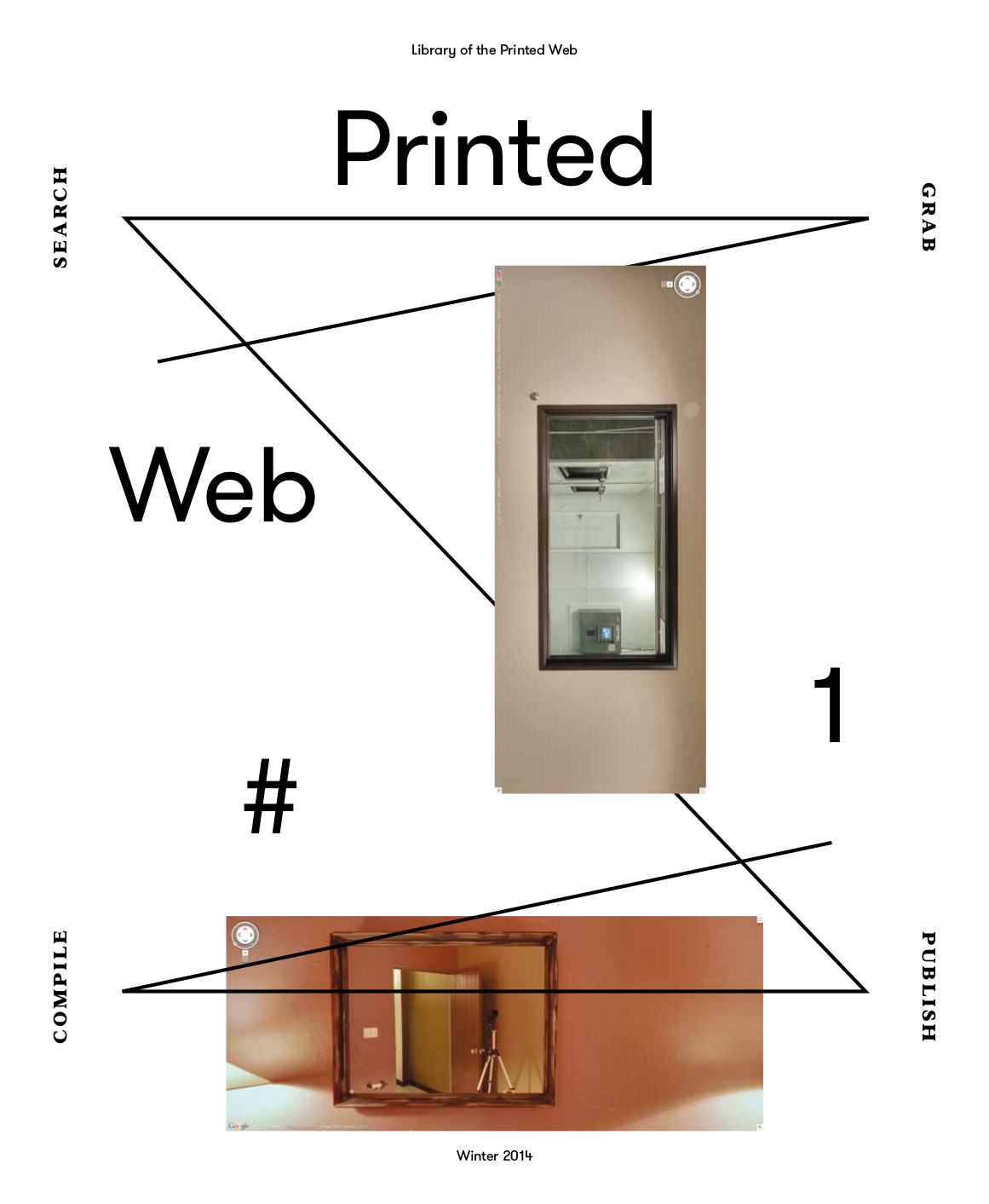Paul Soulellis (ed.): Printed Web (2014–)
Filed under artist publishing, magazine | Tags: · art, culture, internet, web


“Printed Web is a semi-annual print-on-demand publication of web-to-print art and discourse. Inspired by Seth Siegelaub’s group show publications, each issue contains new work by artists who work on, within and around the Internet.”
With contributions from Hito Steyerl, Joachim Schmid, Penelope Umbrico, Christian Bök, Clement Valla, Kenneth Goldsmith, David Horvitz, Chris Alexander, Mishka Henner, Benjamin Shaykin (1), Constant Dullaart, Daniel Temkin, James Bridle, John Zissovici, Cheryl Sourkes, Brian Droitcour, Tan Lin, Angela Genusa, Webdriver Torso, Rafaël Rozendaal, Olia Lialina, Cory Arcangel (2), Alexander Galloway, Silvio Lorusso (3), and many others.
Issue 1
Publisher Library of the Printed Web, Winter 2014
ISBN 9780984005222
64 pages
Issue 2
Publisher Library of the Printed Web, Fall 2014
ISBN 9780984005246
180 pages
Issue 3
Publisher Library of the Printed Web, Spring 2015
ISBN 9781320767903
388 pages + 10 zines x 24 pages
No. 1 (6 MB)
No. 2 (14 MB)
No. 3, FTP (147 folders, 329 files)
No. 3: Ten Zines (ZIP), PDFs
Trebor Scholz: Platform Cooperativism: Challenging the Corporate Sharing Economy (2016) [EN, DE]
Filed under brochure | Tags: · capitalism, collaboration, economics, internet, labour, platform cooperativism, sharing

“The “sharing economy” wasn’t supposed to be this way. Aided by the tiny computers most of us carry with us all day, every day, we would be free from the burdens of ownership and making money in our spare time by renting out our unused possessions. The vison was—or at least appeared to be—an idealistic one. Even before they enter kindergarten, every child learns the value of sharing, and here were the beneficent forces of Silicon Valley bringing us innovative new tools to strengthen our communities, disrupt outdated ways of doing business, and maybe even reduce our carbon footprints.
The reality turned out to be a little different. Sure, Uber and its ilk offer remarkable convenience and a nearly magical user experience, but their innovation lies just as much in evading regulations as in developing new technology. Behind the apps lies an army of contract workers without the protections offered to ordinary employees, much less the backing of a union. This new economy is not really about sharing at all. Rather, as Trebor Scholz argues in this study, it is an on-demand service economy that is spreading market relations deeper into our lives.
With these new middlemen sucking profits out of previously un-monetized interactions, creating new forms of hyper-exploitation, and spreading precarity throughout the workforce, what can we do? Scholz insists that we need not just resistance but a positive alternative. He calls this alternative “platform cooperativism,” which encompasses new ownership models for the Internet. Platform cooperativism insists that we’ll only be able to address the myriad ills of the sharing economy—that is to say platform capitalism—by changing ownership, establishing democratic governance, and reinvigorating solidarity. In this paper, Scholz breathes life into this idea by describing both actually existing and possible examples of platform co-ops, outlining basic principles for fairly operating labor platforms on the Internet, and suggesting next steps.”
Publisher Rosa Luxemburg Stiftung, New York Office, Jan 2016
27 pages
Platform Cooperativism (English, 2016, PDF, 6 MB)
Plattform-Kooperativismus (German, 2016, HTML, added on 2016-6-19)
NUPoD: Print on Demand Poetry: Making Books After the Internet (2015)
Filed under syllabus | Tags: · artists book, book, internet, poetry, postdigital, publishing

“This course operates at the intersection of creative writing, media theory, and the history of the book. Since the written word overtook the Homeric epic poem as a kind of communal Wikipedia, poetry has been less about communicating information and more about lyric expression. Recently, digital technologies have been seen to present this same challenge to the book. Like poetry, we might say that the book isn’t dead, it has simply lost its claim as the primary source of information. Over the last two decades, some of the most interesting works of art and poetry have turned to the book in both form and content, as both inspiration and fallen idol. It has never been easier for writers to publish, not just on Twitter and Facebook, but across a range of Print on Demand (POD) platforms for the printed book. This course examines recent works of poetry alongside new developments in print technologies. From Seth Siegelaub’s The Xerox Book (1968) to new works of POD poetry published throughout the quarter (TBA, 2015), we will study the emergence of innovative forms of writing the book under the influence of digital networks.”
Daniel Scott Snelson, Northwestern University, Fall Quarter, 2015
Course information and publication research conducted by the NUPoD editorial collective

